Great Philosophers / Nobel Laureates - 2 Class 5 Worksheet SST
Q1: Multiple Choice Questions (MCQs)
(i) Socrates believed that the only way to reach the truth was through:
(a) Blind faith
(b) Rational thinking and questioning
(c) Superstitions
(d) Accepting others' opinions
Ans: (b)
Socrates believed that the only way to reach the truth was through rational thinking and questioning.
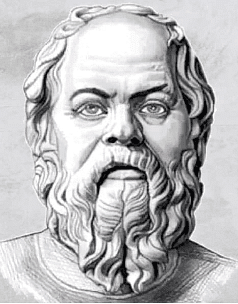
(ii) Karl Marx was against the exploitation of:
(a) Capitalists
(b) Workers
(c) Farmers
(d) Artists
Ans: (b)
Karl Marx was against the exploitation of workers by capitalists.
(iii) Mahatma Gandhi's fight against injustice was based on the principle of:
(a) Violence
(b) Conformity
(c) Satyagraha
(d) Blind obedience
Ans: (c)
Mahatma Gandhi's fight against injustice was based on the principle of Satyagraha, which means nonviolent resistance.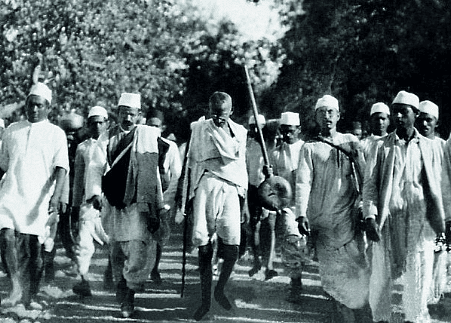 (iv) Martin Luther King was awarded the Nobel Prize for:
(iv) Martin Luther King was awarded the Nobel Prize for:
(a) Literature
(b) Physics
(c) Peace
(d) Medicine
Ans: (c)
Martin Luther King was awarded the Nobel Prize for Peace for his efforts in the civil rights movement.
(v) Abraham Lincoln is known for:
(a) Inventing the telephone
(b) Ending slavery in America
(c) Discovering electricity
(d) Writing famous novels
Ans: (b)
Abraham Lincoln is known for ending slavery in America through his presidency.
Q2: Fill in the Blanks
(i) Socrates taught his disciples that wisdom and honesty are more important than ________ or fame.
(ii) Karl Marx believed that capitalists always try to suppress the ________.
(iii) Mahatma Gandhi's fight against injustice was known as ________.
(iv) Martin Luther King fought for the rights of the ________ in the USA.
(v) Abraham Lincoln was elected as the President of the United States in the year ________.
Ans:
(i) riches
(ii) workers
(iii) Satyagraha
(iv) coloured
(v) 1860
Q3: True or False
(i) Socrates wrote down his teachings in a book. (True / False)
(ii) Mahatma Gandhi's fight was based on violence and aggression. (True / False)
(iii) Karl Marx believed that the poor should remain oppressed. (True / False)
(iv) Abraham Lincoln was shot dead while giving a speech. (True / False)
(v) Martin Luther King followed the principles of non-violence. (True / False)
Ans:
(i) False: Socrates did not write down his teachings in a book.
(ii) False: Mahatma Gandhi's fight was based on non-violence and civil disobedience, not violence and aggression.
(iii) False: Karl Marx believed in advocating for the rights of the working class and addressing their exploitation by the rich.
(iv) False:Abraham Lincoln was shot dead while attending a play at a theater, not while giving a speech.
(v) True: Martin Luther King followed the principles of non-violence in his fight for civil rights.
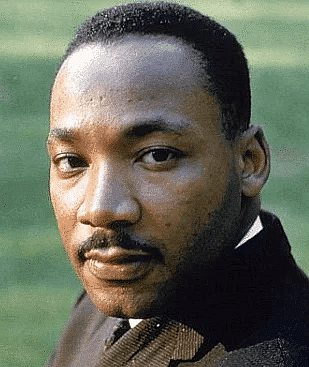
Q4: Match the Following
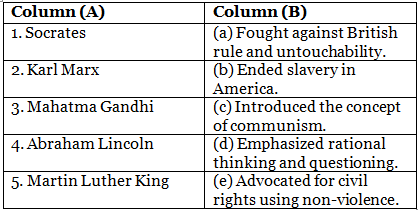 Ans:
Ans: 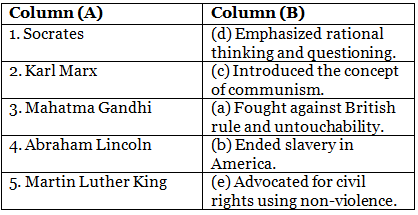
Q5: Short Answer Type Questions
(i) Describe Socrates' teaching method and his guiding principle.
Ans: Socrates engaged in the Socratic method, a form of cooperative argumentative dialogue to stimulate critical thinking and expose ideas to logical scrutiny. His guiding principle was 'Know yourself', emphasizing self-awareness and introspection to seek wisdom.
(ii) How did Abraham Lincoln contribute to the abolition of slavery in the United States?
Ans: Abraham Lincoln served as the President of the United States during a tumultuous time. He opposed the expansion of slavery into new territories and eventually issued the Emancipation Proclamation in 1863, which declared that all slaves in Confederate-held territory were to be set free.
(iii) Explain the main ideas behind Karl Marx's philosophy.
Ans: Karl Marx's philosophy centered around critiquing capitalism and advocating for a classless society. He believed that the working class (proletariat) was exploited by the capitalist class (bourgeoisie). He envisioned a revolution by the working class that would lead to a socialist society and eventually a classless communist society.
(iv) What was the significance of Mahatma Gandhi's principle of Satyagraha in the Indian freedom movement?
Ans: Mahatma Gandhi's principle of Satyagraha involved using non-violent resistance to achieve social and political change. It was based on the idea that individuals could resist oppression through truth and moral courage, which would ultimately compel the oppressor to change. Gandhi employed this principle in various movements, including India's fight for independence.
(v) How did Martin Luther King contribute to the civil rights movement in the USA?
Ans: Martin Luther King was a prominent leader in the American civil rights movement. He advocated for equality and an end to racial segregation using non-violent tactics like boycotts, sit-ins, and peaceful demonstrations. His leadership and speeches, such as the famous "I Have a Dream" speech, played a crucial role in advancing civil rights and promoting social change.
|
33 videos|264 docs|50 tests
|
FAQs on Great Philosophers / Nobel Laureates - 2 Class 5 Worksheet SST
| 1. Who are some of the great philosophers mentioned in the article? |  |
| 2. What is the significance of being a Nobel Laureate? |  |
| 3. Can you explain Aristotle's philosophy in simple terms? |  |
| 4. How are philosophy and science related? |  |
| 5. How are Nobel Laureates selected? |  |





















